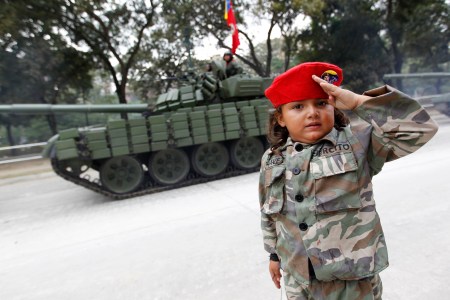Venezuela: Reform of the Conscription Law is unconstitutional

Rafael Uzcátegui
In the National Assembly, a project to reform the Conscription and Military Enlistment Law is currently being discussed. The law has been included in the legislative package considered high priority by the heads of parliament, having been approved in the first debate of 18/06/2013. The project presented, however, is unconstitutional, because it violates what is stated in article 134 of the Magna Carta - that: “Every person, in accordance with the law, has the right to carry out civilian or military service necessary for the defence, preservation and development of the country, or in the face of public disaster. Nobody can be subjected to forced conscription (…)”.
The initiative consists of 120 articles to “establish the rules to regulate the duty that all Venezuelans - men, women, naturalised citizens and legal entities - have, to comply with the Permanent Register and Military Service (MS)”. While article 4 states the military age as being between 18 and 60, article 62 establishes the qualifications of those “eligible” and those “ineligible” to carry out military service. Among the causes of ineligibility are temporary ill health, permanent ill health, being married, pregnancy, being the sole breadwinner of a household or having a forced deprivation of liberty or a prison sentence.
As it does not include the practice of “freedom of conscience” among the reasons not to carry out military service, as is stated in article 61 of the CRBV (Constitution of the Bolivarian Republic of Venezuela), nor citizens’ desire to carry out Civilian Service (CS), the reform proposal infringes on that which is expressed in article 134 of the Magna Carta. Let’s remind ourselves of the debate which took place at the Constitutional Assembly of 1999 which led to the final drafting of the articles concerning carrying out MS in Venezuela. One sector, represented by constitutionalist soldiers argued in favour of mandatory military service being upheld, without forced conscription and foreseeing different ways of carrying out military service. On the other hand, another sector – activists or those involved in the fight for human rights – also called for forced conscription to be abolished and for a civilian service as an alternative to MS, philosophically based on the right to conscientious objection. On that occasion, the constitutionalist Vladimir Villegas stated, “throughout discussions in the Commission for Human Rights, we have been talking about an alternative and mandatory social service. That’s to say, the chance to carry out social service would exist as an alternative to military service”. As the constitutionalist lawyer Jesus Maria Casal reminds us in an analysis, “This juxtaposition of stances has tilted in favour of the alternative nature of CS in respect to MS, in the terms laid out in article 134 (…)
The Constitution envisages a CS qualitatively different to MS, which, in addition, is not subsidiary to the latter, but in fact a principal idea and parallel idea, a choice available to everyone, and obviously it is a substitute for MS. Article 134 thus places the possibilities of carrying out CS and MS in the same hierarchy. This possibility is eliminated by the proposal, presenting the possibility to carry out CS as being subsidiary to MS. The drafting in this respect is confusing and contradictory.
Article 62 of the proposal describes as “Eligible” those who “are of the age and state to carry out civilian or military service, in accordance with the integral defence principles of the Nation”, thus, giving both possibilities the same status. Further on, article 81 establishes “the right to carry out military service” of “Venezuelan men and women and naturalised citizens of military age”, negating the previous idea. This confusion is not coincidental, but in fact conceptual. The initiative suggests that CS is an accessory and supplementary to MS. Article 8 of the proposal states that those “for reasons of this Law cannot carry out MS, should carry out their duty by doing SC”.
The proposal omits the possibility of initially opting for CS, which could only be chosen after having met one of the criteria for not carrying out MS. The proposal establishes that all natural and legal persons must obligatorily enrol and update their details in the Permanent Register and Military List (articles 2, 23, 26.1 and 36). The norm should limit the Military List only to those who freely choose to carry out MS. As Casal quite rightly argues, “A register for CS cannot be inaugurated without there being a law to regulate such (…) If a common register is to be created for all natural persons called on to observe the national duty established in article 134 of the constitution, this register could not be military and it would have to be dictated by the fundamental regulations on civilian service, so that citizens, aware of its scope, can choose between one and the other”.
-- Find Rafa's blog at http://www.rafaeluzcategui.wordpress.com
-- Twitter: @fanzinero
Add new comment